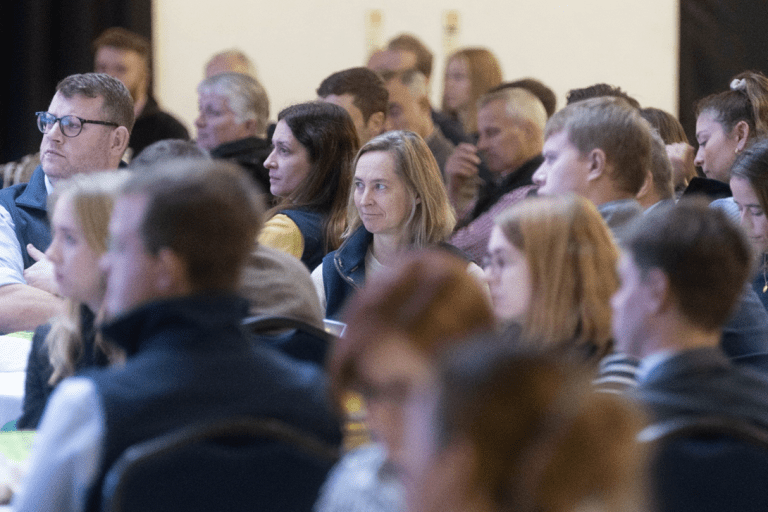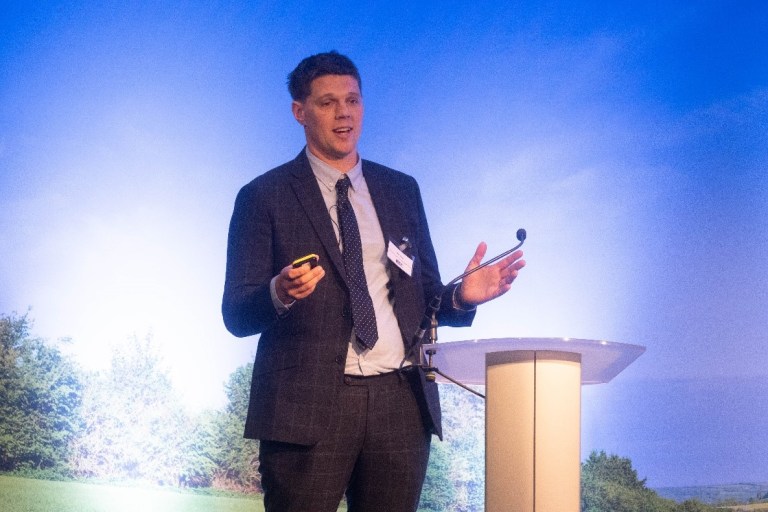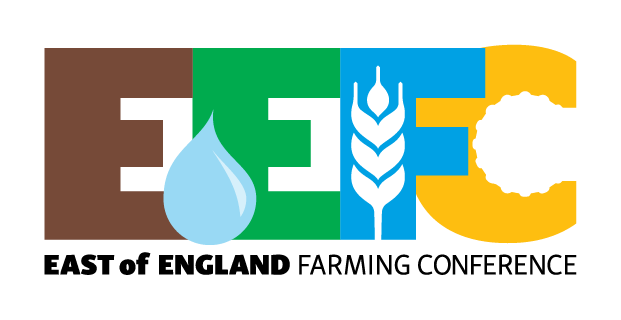If You Are Not Uncomfortable With What You Are Doing, You Are Not Trying Hard Enough To Change
The East of England Farming Conference returned to the East of England Showground, Peterborough, on Thursday 17th November, with 200 decision makers, advisors and policy leaders from the agricultural and horticultural sector challenged by a range of guest speakers and industry speakers, with a focus on encouraging the industry to capture accurate data to help farms become efficient producers of food, whilst reducing greenhouse gas (GHG) emissions.

Joining the conference from Indiana, USA, Rick Clark, regenerative and organic farmer of over 5,600 acres challenged farmers to get comfortable with feeling uncomfortable. “My father didn’t teach me how to farm, he taught me how to think – if you are not uncomfortable with what you are doing, you are not trying hard enough to change,” said Rick.
An inspiring speaker, Rick outlined how important data is to his business, allowing him to have the confidence to radicalise his system to completely regenerative and saving in excess of $2million each year in inputs by scrutinising the data from his soils and cover crops. “I don’t like the word ‘failure’, there are only outcomes you didn’t expect,” continued Rick, who went on to stress the importance of networking with peers within the sector to contextualise those outcomes.
Opening the East of England Farming Conference, Tom Martin – founder of Farmer Time, local farmer and conference chairman – outlined some of the challenges facing the sector and how the sessions during the day would address those: “The weather spectre of 1976 has gone, and we can now inflict our own challenging weather stories on future generations. Whilst the weather wreaked havoc, other major players said ‘hold my beer’, as external factors including the revolving door at number 10 and the war in Ukraine were big influences.”
The theme of the sixth conference was ‘Greener and Leaner – growing resilience in a changing landscape’. Chaired by Joe Stanley, author, conservationist and Head of Training & Partnerships, GWCT Allerton Project, the first morning session on ‘Policy and Leadership’ opened with Lord Curry of Kirkharle, crossbench peer in the Horse of Lords. Lord Curry, who outlined the differences between the current agricultural policy and the post-war years said: “The post-war agricultural policy was singularly focused on producing food, with zero food waste, where any food not eaten in the house was fed to the house pig or chickens to produce food in a different way – the concept of a circular economy is not a new one.”
Lord Curry continued to challenge the conference to help present the sector as the exciting industry that it is to attract the very best, with initiatives such as Farmer Time and the East of England Agricultural Society’s education initiative, Kids Country, helping to engage young people.
Mark Tufnell, farmer and President of the Country, Land and Business Association (CLA), reinforced Lord Curry’s message of prioritising high quality food production alongside stewardship of the land: “At its heart, Environmental Land Management Scheme (ELMS) is right, we should be rewarded for stewardship, but too often there is a false narrative that we must reject making money growing food for this nation in order to do so, but I believe that we can do both.”
“I believe that we can run profitable businesses, feed the nation, and care for the countryside, but only with the right business environment and agricultural policy from the government, “ Mr Tufnell concluded.

This was reinforced by the morning’s final speaker, AB Agri’s Head of Commercial Responsibility, Jen Butcher, who said: “ELMS can be more ambitious than paying farmers to plant hedges; within the next decade we have the technical capacity to have the first net zero dairy farm here in the UK, this is 100% achievable if we incentivise the planting of peas and beans here in the UK through ELMS rather than import soya from South America. We are already part of the way there with ELMS cover crop options, we just need the next step.”
Jen Butcher also outlined the importance of changing public perception of a ‘good’ farm, which currently focuses on more extensive enterprises. “We have to find a way to celebrate ‘good’ productive farms, so when challenges such as avian flu come up, the narrative is about farmers doing the best for the animals in their care by bringing them inside – not this current idea that only entensive farms can mean high welfare.”
After a lunch break, Teresa Meadows, Head of Environment, Audit and Public Affairs at BASIS, chaired the afternoon session on ‘Input Use Efficiency and the Road to Net Zero’. Dr Christina Baxter, Senior Crop Research Scientist, ADAS YEN Zero, said: “It is really important that productivity remains part of the conversation – we have found across the 51 growers that took part in YEN Zero last year, higher yielding crops tend to have lower GHG emissions per tonne. We can’t manage our emissions if we aren’t measuring, so recording that data is so important.”
Hugh Martineau, Head of Sustainability, Map of Ag, outlined the various push factors encouraging the sector to look at GHG emissions, including financial, national, international, supply chain and industry players. “We need to reframe the conversation from an input efficiency angle – looking at nutrition in vs nutrition out to reach a ‘theoretical minimum’ for your business – the point at which your efficiency is optimised. Measuring KPIs that are relevant to each farming business ensures that you are working towards both minimal GHG emissions and also profitability – in a suckled calf enterprise for example, optimising the age of first calving for heifers works towards both reduced emissions and increased profitability.
The conference moved on to the farmer’s perspective, with Will Oliver, Farmers Weekly arable farmer of the year and NFU East Midlands Crops Board Vice Chairman, and Jack Pearce, Director, Alfred G Pearce, sharing their individual stories of how they have approached innovative agricultural practices and succeeded on the road to net zero.
Will Oliver encourage farmers to not even think about net zero: “Net Zero is by-product of being efficient for me – if we all measure and monitor data in order to farm as efficiently as possible, we will achieve Net Zero too.” Farming 2,000 acres of arable crops in Leicestershire, Will encouraged farmers to make use of organic manures to reduce dependency on man-made fertilisers, whilst testing soils annually and monitoring tissue samples of crops throughout the season to make organic and artificial fertiliser application as efficient as possible.

Jack Pearce, director of Alfred G Pearce, carrot growers and food processors supplying directly to the major retailers, said: “Retailers are consumer led, so an important aim for us is to make consumers understand that farmers can help reverse the impact of climate change – we can be a huge part of the solution, but the challenge is who pays for it.”
The East of England Farming Conference was supported by some fantastic local businesses as sponsors, with this year AF Group, Agreena, British Sugar, Brown & Co, Ben Burgess, Oakbank Game and Conservation, Roythornes, Hutchinsons Crop Protection Specialists, and Soil Fertility Services all on board.
The East of England Farming Conference returns for its seventh year in 2023 – Thursday 16th November 2023.
This was reinforced by the morning’s final speaker, AB Agri’s Head of Commercial Responsibility, Jen Butcher, who said: “ELMS can be more ambitious than paying farmers to plant hedges; within the next decade we have the technical capacity to have the first net zero dairy farm here in the UK, this is 100% achievable if we incentivise the planting of peas and beans here in the UK through ELMS rather than import soya from South America. We are already part of the way there with ELMS cover crop options, we just need the next step.”
Jen Butcher also outlined the importance of changing public perception of a ‘good’ farm, which currently focuses on more extensive enterprises. “We have to find a way to celebrate ‘good’ productive farms, so when challenges such as avian flu come up, the narrative is about farmers doing the best for the animals in their care by bringing them inside – not this current idea that only entensive farms can mean high welfare.”
After a lunch break, Teresa Meadows, Head of Environment, Audit and Public Affairs at BASIS, chaired the afternoon session on ‘Input Use Efficiency and the Road to Net Zero’. Dr Christina Baxter, Senior Crop Research Scientist, ADAS YEN Zero, said: “It is really important that productivity remains part of the conversation – we have found across the 51 growers that took part in YEN Zero last year, higher yielding crops tend to have lower GHG emissions per tonne. We can’t manage our emissions if we aren’t measuring, so recording that data is so important.”
Hugh Martineau, Head of Sustainability, Map of Ag, outlined the various push factors encouraging the sector to look at GHG emissions, including financial, national, international, supply chain and industry players. “We need to reframe the conversation from an input efficiency angle – looking at nutrition in vs nutrition out to reach a ‘theoretical minimum’ for your business – the point at which your efficiency is optimised. Measuring KPIs that are relevant to each farming business ensures that you are working towards both minimal GHG emissions and also profitability – in a suckled calf enterprise for example, optimising the age of first calving for heifers works towards both reduced emissions and increased profitability.
The conference moved on to the farmer’s perspective, with Will Oliver, Farmers Weekly arable farmer of the year and NFU East Midlands Crops Board Vice Chairman, and Jack Pearce, Director, Alfred G Pearce, sharing their individual stories of how they have approached innovative agricultural practices and succeeded on the road to net zero.
Will Oliver encourage farmers to not even think about net zero: “Net Zero is by-product of being efficient for me – if we all measure and monitor data in order to farm as efficiently as possible, we will achieve Net Zero too.” Farming 2,000 acres of arable crops in Leicestershire, Will encouraged farmers to make use of organic manures to reduce dependency on man-made fertilisers, whilst testing soils annually and monitoring tissue samples of crops throughout the season to make organic and artificial fertiliser application as efficient as possible.

